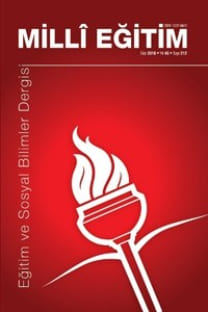PROBLEME DAYALI ÖĞRENME YÖNTEMİNİN SOSYAL BİLGİLER ÖĞRETMEN ADAYLARI ÜZERİNDEKİ ETKİSİ
Bu çalışmada, probleme dayalı öğrenme (PDÖ) yöntemiyle gelenekselöğretim yöntemlerinin sosyal bilgiler öğretmen adaylarının çevre bilinci kazanmaları üzerindeki etkisi araştırılmıştır. Veriler nicel ve nitel araştırma modellerikullanılarak toplanmıştır. Çalışmanın nicel araştırma modeli kısmında PDÖ ilegeleneksel öğretim yöntemlerinin öğrencilerin akademik başarı ile problemçözme becerisi üzerindeki etkisi test edilmiştir. Daha ayrıntılı ve geçerlisonuçlara ulaşmak amacıyla çalışmaya dahil edilen nitel araştırma modeli kısmında ise öğrencilerin geleneksel öğretim yöntemleri ile PDÖ yöntemine yönelik yorumları ve PDÖ’nün kendilerinde bir çevre bilinci yaratıp yaratmadığıhususundaki düşünceleri değerlendirilmiştir. 9 hafta süren uygulama sonucunda her iki araştırma modelinden birbirini tamamlayan sonuçlar elde edilmiştir.Probleme dayalı öğrenme yönteminin öğrencilerin akademik başarıları ile problem çözme becerileri üzerinde geleneksel öğretim yöntemlerine nazaran dahabaşarılı sonuçlar verdiği saptanmıştır. Öğrenciler geleneksel öğretim yöntemlerine yönelik olumsuz eleştiriler, PDÖ yöntemine yönelik olarak ise olumlueleştirilerde bulunmaktadırlar. Araştırma bulgularına göre probleme dayalıöğrenme yöntemi çevre bilinci bulunmayan öğrencilerde çevre bilincinin oluşmasına katkı sağlamaktadır. Ayrıca belirli düzeyde çevre bilincine sahip öğrencilerde de bilinç düzeyinin artmasına ve günlük yaşamlarında bazı davranışdeğişikliklerinin meydana gelmesine imkân tanımıştır
Anahtar Kelimeler:
Nicel araştırma modeli, nitel araştırma modeli, karma yöntemler araştırması, probleme dayalı öğrenme, geleneksel öğretimyöntemleri
IMPACT OF PROBLEM BASED LEARNING METHOD ON CANDIDATE SOCIAL STUDIES TEACHERS
In this study, impact of problem based learning (PBL) and traditional
teaching methods on gaining environmental consciousness of candidate social
studies students was researched. Data were collected using both qualitative and
quantitative research paradigms. In the section of the qualitative research paradigm,
impact of PBL and traditional teaching methods on students’ academic
achievement and problem solving ability was tested. In the section of the quantitative
research paradigm which was added to get more detailed and valid
results, students’ interpretations about PBL and traditional teaching methods
and thoughts about whether PBL created an environmental consciousness on
them were evaluated. In the end of the nine-month-practice some results which
complete one another were obtained from both qualitative and quantitative
research paradigms. It was determined that PBL is more successful than traditional
teaching methods in terms of academic achievements and problem solving
abilities of students. Students have negative critiques related with traditional
teaching methods, while positive critiques about problem based learning
method. They emphasize that PBL has improved their consciousness about
environmental problems or increased their anxieties they already have in this
issue. They also say that this method caused some behaviour changes in their
daily life with examples.
Keywords:
Qualitative research paradigm, quantitative research paradigm, mixed methods research, problem based learning, traditional teaching methods,
- ISSN: 1302-5600
- Yayın Aralığı: Yılda 4 Sayı
- Başlangıç: 1973
- Yayıncı: Milli Eğitim Bakanlığı
Sayıdaki Diğer Makaleler
YARATICI DRAMA YÖNTEMİNİN İLKÖĞRETİM 6. SINIF ÖĞRENCİLERİNİN TÜRKÇE DERSİ TUTUMLARINA ETKİSİ
Akif ARSLAN, Abdullah ŞAHİN, Esin ŞAHİN, Ahmet AKÇAY
ARMONİ DERSİNE İLİŞKİN TUTUM ÖLÇEĞİNİN GELİŞTİRİLMESİ
MÜZİKSEL ALGI VE BİLGİLENME ÜZERİNE BİR DEĞERLENDİRME
ORTAÖĞRETİM ÖĞRENCİLERİNİN BAŞARISIZLIK NEDENLERİNE İLİŞKİN ÖĞRETMEN GÖRÜŞLERİ
TARİH DERSLERİNDE TARİH WEB SİTELERİNİN ELEŞTİREL BİR BARIŞ AÇISIYLA İNCELENMESİ
HAYAT BİLGİSİ DERSİ ÖĞRETİM PROGRAMINDA LİDERLİK ÖĞRETİMİ
ORTAÖĞRETİM ÖĞRENCİLERİNİN BAŞARISIZLIK NEDENLERİNE İLİŞKİN ÖĞRETMEN GÖRÜŞLERİ
